Cost of Honor Read online
Page 4
Blair didn’t envy him the job, even when he was irritating her no end with his anal obsession over every word spoken by or about anyone from the president to the most naïve campaign volunteer. She had enough to handle with the constant presence of the press, the escalating threat of terrorism—abroad and at home—and the risks to the people she loved without having her every word subject to his approval.
She sighed. Another media snafu of some kind, most likely.
“He does know we’re about to leave for vacation, doesn’t he?” Blair’s heart rate settled down, but something still wasn’t making sense. Why send Stark and an escort? And for some reason, Cam looked worried. “What?”
“Adam’s dead.”
Ready room, OEOB
7:15 a.m.
“Let’s run down where we are with the Philadelphia advance now,” Tom Turner said after they’d reviewed the president’s itinerary and the accompanying working shift assignments. He focused on Oakes. “Weaver?”
“The division leads have completed preliminary assessments with main and backup airports, local police, and the Philadelphia field office,” Oakes said. “We still don’t have an itinerary beyond departure time, and the hotel vetting is still ongoing—so no motorcade routes.”
Turner’s brows flickered. He wasn’t happy and Oakes didn’t blame him. The greatest areas of risk for the president were along the motorcade route, where potential attack could come from buildings or intersections along the way, and the rope line, when he’d be exposed to crowds of people only a few feet away.
“Shift assignments?” Turner asked.
“Waiting to get a list of available agents from New York, Philadelphia, Pittsburgh, and DC.”
“We’ll want everyone in place two weeks before game time,” Turner said.
“Yes, sir.” Oakes knew this as well, as did every other agent in the room.
“What about the hotel?” Turner asked.
Oakes nodded to Luther Wisnicki, the agent taking the lead on securing accommodations for the president, his daughter, and the White House staffers and press. Wherever the president stayed would need to have two avenues of egress to major thoroughfares in case of immediate evacuation, and be large enough for the retinue to take over three floors, the elevators, and a major portion of the kitchen. Because of the gross disruption to business as usual, many hotels weren’t all that eager for the president to stay with them.
“We’re vetting five,” Luther Wisnicki said when Oakes gave him the go-ahead. “Two Marriotts, a Hilton, a Sheraton, and an Omni,” he said, referring to his iPad. “Security checks are completed on the Marriott and should be finished at the rest in a week. All five utilize day hires, and that’s slowing down the clearances.”
“The hotels that can’t do without short hires for the length of POTUS’s stay should move down the list,” Oakes said. “It’s too easy for someone to impersonate staff and go unnoticed among a lot of unfamiliar faces.”
“Agreed. Unfortunately, it’s pretty common in all of the hotels now.”
“Everyone will be wearing security-approved IDs,” another agent said, “and those won’t be released until twelve hours before game time.”
“Still plenty of time to have them duplicated,” Turner said. “Even with embedded code cards, everyone will need a facial ID before entering for work. Let’s nail down the hotel so we can get started on the database.”
“We’ve got a list of hotel guests checking in within two weeks prior to game day,” Oakes said. “So far, nothing rings a bell at any of the hotels.”
Evyn added, “We’re running advance reservations from airlines, train stations, and Ubers through the Terrorist Alert Database on a daily basis. Same for hotel reservations, although most don’t require ID to reserve.”
“Airbnb?” Turner asked.
Oakes shook her head. “There’s no central database. Anyone could be staying in an apartment across the street from the Convention Center, and we wouldn’t know it.”
“Let’s step up photo surveillance of pedestrian activity in the area and CCTV feeds of vehicles moving within midperimeter borders,” Turner said.
Oakes made a note. “Roger that.”
“All right,” Turner said. “Where are we with hospitals? We—” Frowning, he glanced down at his phone. “Hold on.”
“Turner,” he said sharply and listened for a second, his eyes hardening. “Copy that. Close the grounds to tours and evacuate any unauthorized, move CAT teams to the guard posts, put Andrews on ready alert. Bring the Beast to the south circle and alert Metro motor patrol we may need a route cleared for POTUS.”
Turner stood. “Weaver, Daniels, you’re with me. The rest of you stand by to evacuate.”
Oakes and Evyn hurried to join him as the other agents abruptly filed out to take their posts. Oakes’s pulse jumped and adrenaline sharpened her sight until every object jumped into gleaming relief. Game on.
Philadelphia
7:20 a.m.
Hands dropped onto Sloan’s shoulders and a soft voice murmured in her ear, “You didn’t come to bed last night.”
Sloan looked up from her monitors. Blue skies filled the tall windows at the far end of the loft. Huh. Morning already. A familiar scent of orange blossom shampoo and vanilla teased her. She tilted her head back and kissed her wife on the cheek. “Sorry. I just—”
“Got caught up,” Michael said, her full, sensual lips lifting as she smiled. She’d caught her long blond hair back in a careless ponytail and wore one of Sloan’s T-shirts with a pair of loose cotton drawstring pants. “I know.”
“Sorry.” Sloan spun around and pulled Michael down onto her lap. “How come you look so sexy in that shirt?”
“Eye of the beholder, lucky for me.” Michael threaded her arms around Sloan’s neck and twisted until she faced Sloan. The press of her breasts caught all of Sloan’s attention.
“What time are you due in this morning?” Sloan asked, nuzzling her neck.
Michael chuckled. “One of the perks of being the boss is I can make my own hours. Aren’t you tired?”
From behind them, the huge industrial elevator doors whooshed open, and a cacophony of voices quickly spread throughout the loft.
“Damn it,” Sloan muttered.
Michael sighed. “Whatever you were about to suggest is going to have to wait, I take it.”
“Let me just catch them up, and I’ll meet you upstairs.”
“I’ll take you up on that. Don’t be too long.”
Sloan grabbed Michael’s hand before she could get up and kissed her for a long, satisfying moment. Almost but not quite enough.
A whistle sounded from across the room.
Sloan opened an eye as Michael stepped away. The team had arrived, led by Sandy, followed close behind by Jason, Dell, Watts, and the lieutenant. Sandy Sullivan, the youngest on their team and Michael’s close friend, rolled her eyes good-naturedly in their direction.
Watts, slimmed down after his recent heart attack and looking a decade younger for it, still managed to look derelict in baggy pants and a rumpled white shirt. His grizzled unshaved jawline added to his jaded, burned-out cop look, a look that had fooled many a perp just before Watts turned the key on them and locked them away. “Some of us are planning to work today.”
“Good morning, Detective,” Michael said, and Watts blushed.
“Morning, Michael,” he said.
Michael had that effect on everyone, an involuntary rush of heat in the presence of someone so ethereally beautiful.
“I won’t be long,” Sloan said, rising as Michael stood.
“Do what you have to do,” Michael said. “I’ll be there.”
Sloan squeezed Michael’s hand. “Promise?”
Michael smiled again, but her eyes were dark, fathomless, endless. “Always.”
More energized by the exchange than eight hours of sleep and any sort of nourishment could provide, Sloan rose to join the others as they all trooped to the far end
of the huge warehouse work area, wending their way between the myriad monitors, communication arrays, surveillance equipment, and other tools of the cybersecurity trade to the conference area in the back. Lieutenant Rebecca Frye walked out of the only private area in the loft, a ten by ten room with a row of waist-high windows facing into the loft that served as her office, with a cup of coffee in her hand.
Sloan frowned. “How long have you been here?”
“An hour or so,” Frye said, refilling her coffee mug from a big pot on a counter beside the table. Tall narrow windows afforded a view of the Delaware River and New Jersey on the far shore. Oil tankers and container ships floated at berth in the port or moved slowly past, heading south to the sea.
“Why didn’t I know that?” Sloan said.
“Because when I came in you were in the zone, and fortunately, I’m not a cat burglar.”
Sloan grinned. “I would have noticed if you’d started lifting my stuff.”
Frye, as glacially cool as ever, grinned for a millisecond. “We’ll have to test that out sometime. Got something?”
“Could be—still tugging threads,” Sloan said.
“Hey,” Jason said, dropping into a chair at the end of the table. “How come you didn’t call me if you were on to something?”
“Because you’re chronically sleep deprived. The baby business is killing you. Can’t believe you’ll have another one soon.”
Jason grinned. “Hey, they’re like puppies—two are no more trouble than one.” He smirked, and for just an instant, Jasmine peeked out from behind Jason’s preppy façade. “I could have been helpful last night, you know.”
Sloan lifted a brow. Her partner in the cybersecurity wing of the team, whom she worked with day and night, could move from his preppy male identity to a sultry, sexy female named Jasmine in a heartbeat. Sloan was never sure when Jasmine would appear to tease her in a way that always stirred something beyond Sloan’s control. Some primal response that intrigued and mystified. They both understood, with no words being spoken, that their bond would never extend beyond that silently acknowledged connection.
“And you shall be helpful,” Sloan said. “I want to run geographic demographics.”
“Mm,” Jasmine purred. “One of my favorite things.”
Sandy snorted. “You’re both sick.”
Sloan laughed. “Your point?”
In a tight pale green T-shirt with some kind of flower design and skinny jeans with holes in the knees, Sandy still didn’t look more than eighteen, which had been about the time Frye had pulled her out of the mire of the streets and turned her into a confidential informant. Reluctant at first, Sandy had eventually abandoned the streets and now was a cop. Falling in love with Dell Mitchell might have been partly responsible for her transformation, but her street smarts and toughness were what made her a key contact with any number of street people. Frye had made that argument when getting her transferred back to the team from Narco.
Frye said, “All right, people, let’s hear what we’ve got.”
Sloan filled them in on the patterns she’d pulled on threat subject movements. “It’s preliminary, but I’ve got a feeling.”
Frye grimaced. “Your feelings usually mean something. You and Jason chase it.”
Sloan felt the familiar rush of the hunt and nodded sharply. “We’re on it.”
Frye turned to Dell, who’d arrived in her usual black tee, black jeans, and biker boots. Her slicked-back jet hair and smoldering good looks completed her bad-boy look. “Dell?”
Dell had been assigned to the gang division as liaison ever since the uptick in street activity in the past six months. Dell’s gender-fluid undercover persona, Mitch, managed to move among the shifting ethos of sex clubs and drug rings where regular undercover cops could not.
“Territorial disputes per usual,” Dell said. “The Raptors are talking about getting into the gun trade.”
“Sources for that?” Frye said.
“There’s a pretty steady weapons train coming up from the south,” Dell said. “Mostly small batches in private cars. They’re looking for contacts.”
“What are they planning to use for cash?”
“Drugs.”
“Since we’ve cramped Colombian channels through the port, that might be difficult.”
“Which means more street-level competition for what’s getting through,” Dell said.
“All right, let’s follow the money,” Rebecca said. “If they want guns, they’ll need backing. Flag anything that smells like an alliance with right-wing groups. They’d make natural bedmates.”
“Got it,” Dell said.
Frye glanced at Sandy. “Anything heating up in that area?”
“About what we’ve been seeing. The white supremacist recruiters are hitting the college campuses pretty hard, and they seem to be getting some traction, especially with all the talk of cutting back on educational funding. The immigration and diversity funding proposals at the federal level are adding more fuel to that fire. A lot more heat being generated than a year or two ago.”
Rebecca rubbed her eyes. “We haven’t seen political unrest at the campus level like this since Vietnam.”
“Which you, of course, remember personally,” Sloan said.
Another flicker of a smile from Frye. Her cool elegant features and ice blue eyes, to someone who might not know her, suggested she was humorless and stiff-necked. Nothing could be further from the truth. What she was was absolutely solid and the bedrock of their entire team. She was also Sloan’s best friend.
“My mother,” Rebecca said dryly. “Big-time campus agitator. Got arrested a few times. Actually met my dad that way, who…” Frye looked away. “Well, he was a little more conventional.”
“Right, he was a cop,” Sloan said, giving Frye a second to regroup.
“Yeah,” Frye said briskly. “In the blood and all.”
“Any rate,” Sandy said smoothly, “we can expect substantial street protests in June.”
“Keep your files updated,” Frye said. “The feds will be around at some point. Watts—you can field their requests.”
Watts made a sour face. “Dandy. Probably another bunch of wet-behind-the-ears college kids with big”—he side-eyed Sandy—“guns.”
She grinned.
“Probably hear sooner,” Sloan cut in. “I sent my report to the Global Terrorist Database per protocol. Homeland will have it by now. So will the Secret Service.”
“All right everyone, let’s get to work,” Frye said.
As they filed out, Watts muttered, “Anyone want to put money down on how long it takes the suits to arrive?”
“I’m in,” a chorus of voices proclaimed.
Sloan looked over her shoulder and caught Frye’s smile. Then she slipped away to join Michael upstairs.
Chapter Four
As Blair and Cam exited the elevator with Stark, Will Sato, who’d gone down ahead of them, opened the lobby door and spoke into his radio, alerting the driver of Blair’s approach. As he spoke, he continually scanned the area east of Cam and Blair’s condo building. The armored limo was visible through the glass double doors, idling at the curb. The back door was open, and a female agent Blair didn’t recognize—someone probably pulled from the Washington office to cover this emergency trip—stood beside it, facing the opposite direction from Sato, covering the rest of the street.
Blair crossed the lobby, her hand just touching the back of Cam’s charcoal suit jacket. No matter the crisis, she’d never seen Cam look less than magazine-cover perfect. Maybe her arresting appearance had nothing to do with her immaculately cut suit and more to do with her chiseled features and classic profile. Even now, with the edge of dread slicing through her middle, her heart sped up to look at her. And she knew too that beneath the attraction, beyond the compelling magnetism, lay the true source of Cam’s charisma—her utter and unassailable strength. Cam radiated confidence and competence, and everyone around her sensed it.
&nb
sp; Blair was glad for that unbendable strength right now as she struggled to absorb yet another unfathomable blow.
Adam, dead. How could that be? He was what? Early thirties? Not that much older than her. She’d known him longer than she’d known Cam, since the early days of her father’s first campaign, when Adam had emerged as another of the wonder kids who had been instrumental in her father’s sweeping and somewhat unexpected surge to the White House. She’d seen articles written about her father’s White House in those critical first ninety days, about how the stern, older, business executive types who’d populated the West Wing during the last administration, slaves to decorum and protocol, had been usurped by preppies in khakis and button-down shirts and more enthusiasm than savvy. Sometimes, in the early days, her father’s young staffers had exhibited more enthusiasm than skill, but that had changed, and quickly. Lucinda Washburn had guided the transformation, Blair thought, as she automatically followed the route toward the waiting vehicle she had taken hundreds of times before, striding quickly between the subtle cordon of protective agents directly into the back seat of the limo, settling against the plush leather seats with her thigh against Cam’s as the agent closed the door and the limo glided away.
Lucinda, her father’s Chief of Staff. Lucinda was not unskilled, unsavvy, or undisciplined. Lucinda was the woman, Blair was pretty certain, her father loved, and the one who provided a sounding board for him when critical decisions needed to be made. Lucinda saw that what needed to be done was indeed done, while simultaneously shielding the president from many of the outside forces that could distract and overburden him.

 Secrets of the Heart
Secrets of the Heart Clinical Trials
Clinical Trials Blessed Benediction
Blessed Benediction Happy, Happy Birthday, Baby
Happy, Happy Birthday, Baby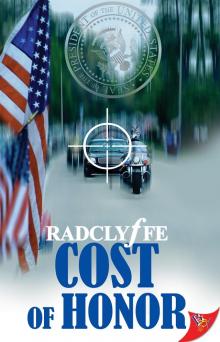 Cost of Honor
Cost of Honor Love on the Night Shift
Love on the Night Shift Top of the Class & Bonus Night
Top of the Class & Bonus Night You Don’t Bring Me Flowers
You Don’t Bring Me Flowers When Dreams Tremble
When Dreams Tremble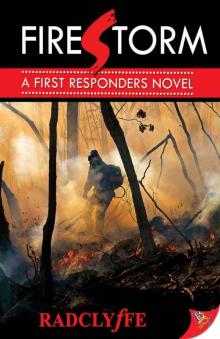 Firestorm
Firestorm The Color of Love
The Color of Love Women of the Dark Streets
Women of the Dark Streets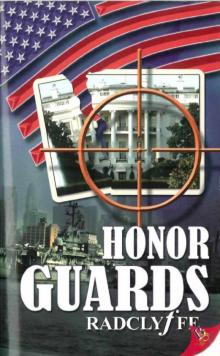 Radclyffe - (Honor 4) - Honor Guards
Radclyffe - (Honor 4) - Honor Guards Honor 03 - Love And Honor
Honor 03 - Love And Honor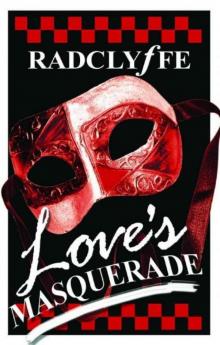 Love's Masquerade
Love's Masquerade Love After Hours
Love After Hours OMGQueer
OMGQueer A Matter of Trust
A Matter of Trust Honor Under Siege
Honor Under Siege Best Lesbian Romance 2009
Best Lesbian Romance 2009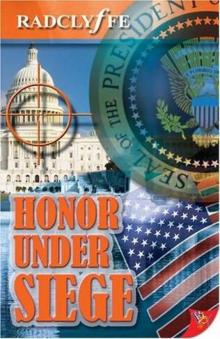 Honor 06 - Honor Under Siege
Honor 06 - Honor Under Siege Best Lesbian Romance 2012
Best Lesbian Romance 2012 Breathless
Breathless Nick of Time
Nick of Time The Lonely Hearts Club
The Lonely Hearts Club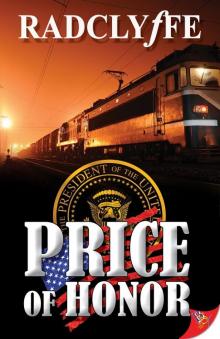 Price of Honor
Price of Honor Word of Honor fr-7
Word of Honor fr-7 Winds of Fortune (Provincetown Tales Book 5)
Winds of Fortune (Provincetown Tales Book 5) Above All, Honor
Above All, Honor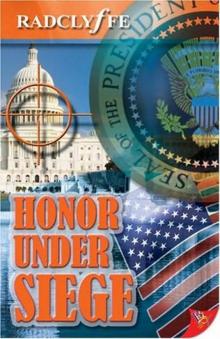 Radclyffe - Honor 06 - Honor Under Siege
Radclyffe - Honor 06 - Honor Under Siege Distant Shores, Silent Thunder
Distant Shores, Silent Thunder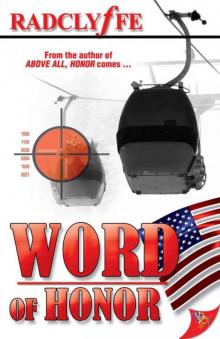 Word of Honor
Word of Honor Word Play
Word Play Fated Love
Fated Love Homestead
Homestead Radical Encounters
Radical Encounters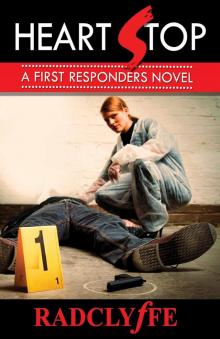 Heart Stop
Heart Stop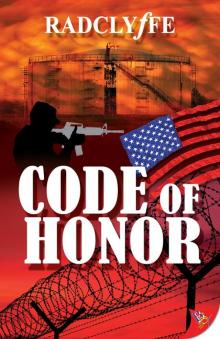 Code of Honor
Code of Honor Myth and Magic
Myth and Magic Wild Shores
Wild Shores Oath of Honor
Oath of Honor Desire by Starlight
Desire by Starlight Love Burns Bright
Love Burns Bright Promising Hearts
Promising Hearts Helplessly Hers
Helplessly Hers Love & Honor h-3
Love & Honor h-3 All About Us
All About Us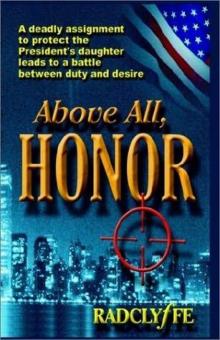 Honor 01 - Above All Honor
Honor 01 - Above All Honor Honor 05 - Honor Reclaimed
Honor 05 - Honor Reclaimed Innocent Hearts
Innocent Hearts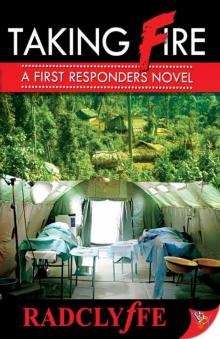 Taking Fire
Taking Fire In Pursuit of Justice
In Pursuit of Justice Love's Melody Lost
Love's Melody Lost Passion's Bright Fury
Passion's Bright Fury Returning Tides
Returning Tides Change of Pace
Change of Pace Safe Harbor
Safe Harbor Night Call
Night Call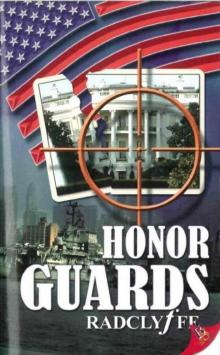 Honor 04 - Honor Guards
Honor 04 - Honor Guards Honor Bound
Honor Bound Cruising the Strip
Cruising the Strip Above All, Honor h-1
Above All, Honor h-1 Honor Reclaimed
Honor Reclaimed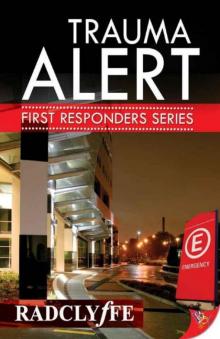 Trauma Alert
Trauma Alert Love On Call
Love On Call Best Lesbian Romance 2014
Best Lesbian Romance 2014 Discovery
Discovery shadowland
shadowland Justice for All
Justice for All Best Lesbian Romance 2011
Best Lesbian Romance 2011 Turn Back Time
Turn Back Time Winds of Fortune
Winds of Fortune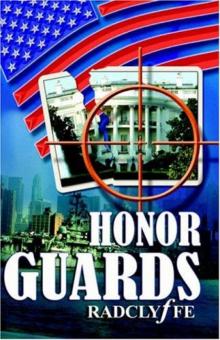 Honor Guards
Honor Guards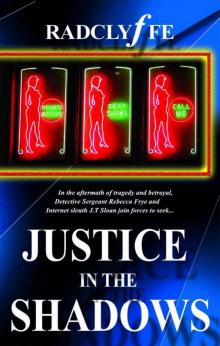 Justice in the Shadows
Justice in the Shadows Love's Tender Warriors
Love's Tender Warriors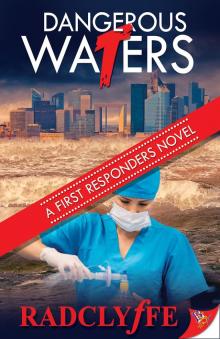 Dangerous Waters
Dangerous Waters First Sight
First Sight By the Light of the Moon
By the Light of the Moon Honor 07 - Word Of Honor
Honor 07 - Word Of Honor Tomorrow's Promise
Tomorrow's Promise Amor and More
Amor and More Best Lesbian Romance 2010
Best Lesbian Romance 2010 Sheltering Dunes (Provincetown Tales Book 7)
Sheltering Dunes (Provincetown Tales Book 7) Love And Honor
Love And Honor Secret Hearts
Secret Hearts Prescription for Love
Prescription for Love Passionate Rivals
Passionate Rivals Against Doctor's Orders
Against Doctor's Orders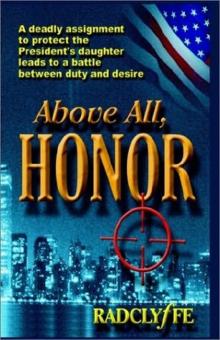 Radclyffe - Honor 01 - Above All, Honor
Radclyffe - Honor 01 - Above All, Honor Honor 02 - Honor Bound
Honor 02 - Honor Bound Beyond the Breakwater
Beyond the Breakwater Radclyffe - (Honor 5) - Honor Reclaimed
Radclyffe - (Honor 5) - Honor Reclaimed Storms of Change
Storms of Change Honor Bound h-2
Honor Bound h-2 Justice Served
Justice Served Sheltering Dunes
Sheltering Dunes Best Lesbian Romance of the Year
Best Lesbian Romance of the Year Secrets in the Stone
Secrets in the Stone